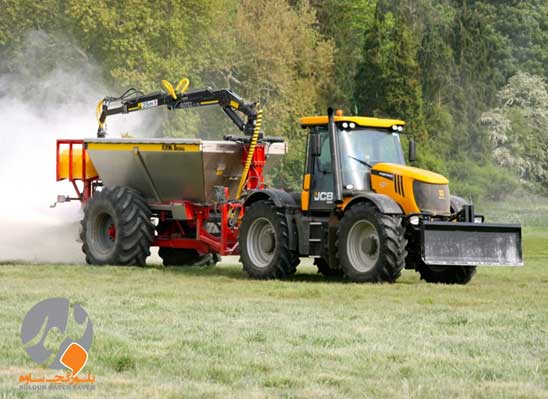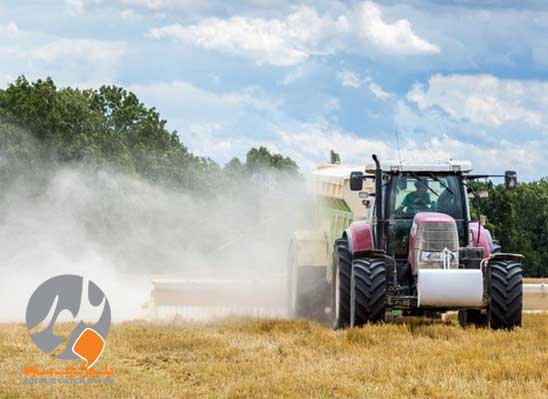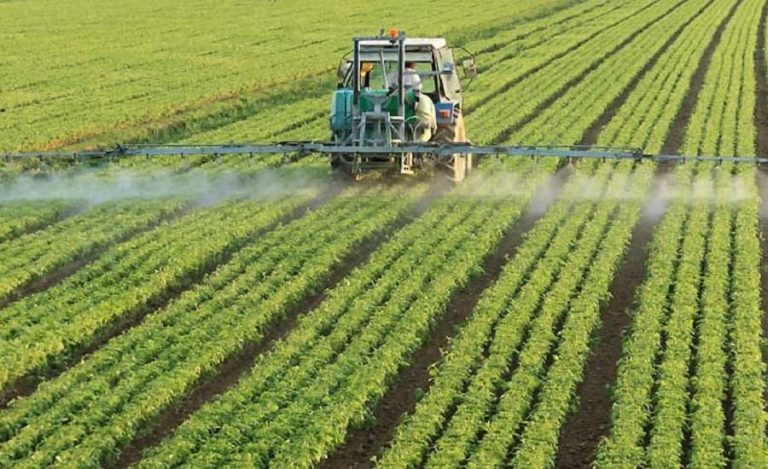All you need to know about agricultural plaster!
The public knows plaster as a construction material, but you should know that plaster is also used in various industries such as ceramics, medical glass and agriculture. Perhaps for most people and even farmers, the use of agricultural plaster seems unusual and strange, and the question arises, is agricultural plaster the same as building plaster? No, agricultural plaster is used to improve and modify the soil. About two centuries ago, in different states of America, agricultural plaster was used to improve soil texture and improve plant growth in grape and apple fields.
If you also want to know the difference between agricultural and construction plaster and to be aware of its important benefits, we have prepared all the things you need to know about agricultural plaster.

What is agricultural plaster?
The two elements of soil and water are of great importance in the production of agricultural products. Over time, the quality of soil and water decreases, and to increase the quality of the product and improve the yield of the soil, the soil of gardens and fields must be modified. One of the cheapest ways to improve the soil is to use agricultural plaster. The use of this plaster does not harm plants and humans due to its natural nature and helps to produce natural and organic products.
What is the difference between agricultural plaster and building plaster?
It should be said that gypsum or natural gypsum is the origin of both products, with the difference that for the production of construction plaster, gypsum goes to the factory after extraction and enters the processing process and is so-called calcined, but agricultural gypsum is powdered gypsum. It is raw and no process is done on it.
Agricultural gypsum is the aqueous calcium sulfate that does not contain salt and has very little lime. The calcium in gypsum in agriculture causes the soil salinity to disappear and the soil to become lighter. The ratio of calcium to magnesium in it should be higher than 70 to 1.
Benefits of using agricultural plaster in fields and gardens:
Reducing soil pH in agricultural plaster
The lower the amount of annual rainfall, the amount of salt in the soil increases and the soil becomes more alkaline, making the soil unsuitable for agriculture and causing the loss of cultivation in these fields. It is better to solve this problem and improve alkaline soils. Agricultural plaster should be used. In fact, the reactions of agricultural plaster with materials in alkaline soils cause a decrease in soil pH.
Application of gypsum in agriculture to reduce soil salinity
Lack of water and loss of soil organic matter causes soil salinity. Soil salinity in the upper soil levels is not important for crops and trees, and the salinity must be reduced near the hairy roots of the trees. After heavy irrigation, the use of agricultural plaster and deep plowing can direct the gypsum material that is dissolved in water to the roots. In this way, the salinity of the soil on the root surface is reduced and different elements are better absorbed by the roots.
Calcium in agricultural gypsum
Two important elements for plants are calcium and sulfur. Agricultural gypsum is a rich source of calcium. The presence of calcium in the soil strengthens the plant and prevents the fruits from cracking. It is better to use agricultural gypsum to have one-hand and healthy export and organic products.
Sulfur element in agricultural gypsum
Sulfur is one of the most important elements in plant cultivation. This element is found abundantly in agricultural plaster and plays an important role in protein production. Symptoms such as yellowness and Chlorosis of leaves or other parts of the plant indicate a lack of sulfur in the soil.
Sulfur prevents the growth of fungal diseases. Some diseases grow in the form of soil and affect the roots and body of the plant, which can be prevented from entering the roots of pathogens and disinfecting the wounds on the plant with agricultural plaster. Sulfur can be added to the soil in different ways, but it is better to use the sulfur in agricultural plaster to produce organic agricultural products.
The use of gypsum in agriculture removes plant poisons
Al+3 is found in alkaline and saline soils, which causes soil poisoning and causes some plants not to produce good crops. The calcium present in agricultural plaster reduces plant poisoning and removes Al+3 from the reach of the plant and deactivates it. By using agricultural plaster, it is possible to eliminate harmful substances that may be easily absorbed by the plant due to the soil conditions. Using agricultural plaster makes the plant grow in good conditions.
Improving soil structure
Most soils without organic matter need agricultural gypsum. Soils without organic matter do not allow plants to grow well. The use of gypsum in agriculture causes soil porosity around the roots and improves the possibility of root growth and also prevents the formation of crusts on the soil surface and prevents the scattering of soil particles and thus improves the strength of the soil.
Application of gypsum in ventilation
One of the important factors to improve soil texture is ventilation. Roots need extra space to grow, and plant growth improves by increasing the open pores of the soil. Agricultural gypsum together with organic matter in the soil increases the activity of worms and the growth and reproduction of worms increases soil ventilation and granulation.
Absorption of inaccessible elements
Sulfate in agricultural plaster has a great effect on soil quality. There are elements and ions in the soil that are impossible to absorb and are beyond the reach of the plant. Sulfate in agricultural plaster makes the ions that are unabsorbable in the plant usable. Zinc and iron are among the important and micronutrient elements of the plant. Al+3 material removes these elements from the reach of the plant. Sulfate present in agricultural plaster reacts with this substance and makes iron and zinc absorption faster.
Gypsum in agricultural soil increases irrigation efficiency
In dry areas, adding gypsum to the soil increases the water penetration coefficient, increases soil moisture storage and root penetration in the soil. These things increase the efficiency of irrigation. In the soils where agricultural gypsum is used, they store 25% to 75% more water than the soils without gypsum.
Reducing and eliminating the unpleasant smell of animal manure
If animal manure and agricultural plasters are used at the same time, the unpleasant smell of manure due to the presence of ammonia resulting from the microbial decomposition of manure will be reduced. The mixture of agricultural plaster and fertilizer causes the sulfate in the gypsum to absorb the ammonium released from the animal manure and it turns into ammonium sulfate. This prevents unpleasant odors and also reduces nitrogen wastage.

Time to use agricultural plaster
The most important purpose and application of agricultural gypsum in pistachio orchards and fields is to improve the soil. The best time to use agricultural plaster is in autumn and winter when the trees are sleeping.
The method of using agricultural plaster in gardens
Gypsum is sprinkled in lump form on both sides of the tree in the form of a strip with a distance of 1.5 meters from each side of the soil. Then heavy irrigation is done so that plaster penetrates all layers of the soil. If gypsum does not penetrate well into the soil and accumulates in the upper layers, it will interfere with the absorption of nutrients as a limiting layer. Today, mostly agricultural powder gypsum is used. Powdered gypsum easily dissolves in water and enters the lower layers of the soil along with the water.
The best collection for buying agricultural gypsum
The use of agricultural plaster improves the soil and increases crops. In this article, we have explained the difference between agricultural plaster and building plaster and we have fully described the 10 benefits of using plaster in agriculture and found that the benefits of using agricultural plaster are more than the disadvantages of agricultural plaster. To buy the highest quality agricultural gypsum, it is enough to choose your products through Bolour Gatch Saveh site and be sure that you have bought the right price.


Wonderful beat ! I would like to apprentice while you amend your site, how could i subscribe for a blog website?
The account helped me a acceptable deal. I had been tiny bit acquainted of this your broadcast
provided bright clear concept
Feel free to surf to my page :: اداة الايروبريس